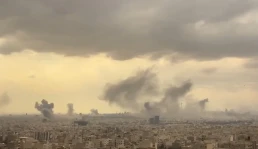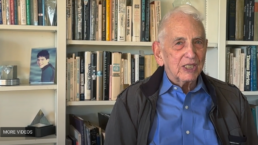The history of Israel’s incursions into Lebanon are a series of lessons in futility and the arrogance of power. If only anyone were paying attention.
By Charles Glass, The Nation
The Kamal Adwan Hospital in northern Gaza is appealing for fuel to run its generators amid a siege and evacuation order by the Israeli military that threatens the lives of its patients, including more than a dozen children in the Intensive Care Unit. At the southern end of the Strip, the Mohammed Yusuf al-Najjar Hospital was forced to cease operating by Israeli military pressure—depriving Gaza of its only kidney dialysis unit. Elimination of hospitals has become a normal aspect of what the United Nations calls Israel’s “concerted policy to destroy Gaza’s healthcare system.” It is worth reflecting not only on the two hospitals’ fates but also on their names: Kamal Adwan and Mohammad Yusuf al-Najjar. They tie Gaza to Lebanon, where I was living on the night both of them were murdered.
Adwan and Najjar, senior officials in the Palestine Liberation Organization (PLO), were asleep in their beds in Beirut’s relatively affluent Verdun area on April 9, 1973, when Israeli death squads shot them both. The joint Mossad-Israeli army “Operation Spring of Youth” also killed Najjar’s wife and PLO spokesman Kamal Nasser. A unit of the same hit-team blew up a building in another Beirut neighborhood to kill 35 members of the Popular Front for the Liberation of Palestine.

“It was one of the biggest targeted killing operations of the twentieth century, if not the biggest,” wrote Ronen Bergman in his definitive account of Zionist assassinations from 1907 to 2018, Rise and Kill First. The murders enhanced Israel’s reputation for effective elimination of enemies—but also helped to spark Lebanon’s civil war and, as a result, Israel’s invasions of 1978, 1982, 2006, and, here we go again, 2024. Half a million people, mainly Palestinians and Lebanese Sunni Muslims, showed up for the funerals of Najjar, Adwan, and Nasser. Furious pro-Palestinians blew up the Lena Car agency that unknowingly rented the cars to Mossad’s agents, while the ABC News bureau chief, Peter Jennings, was asleep in his apartment upstairs. The Lebanese government, shown incapable of defending the country, resigned. A month later, the Lebanese Army attacked the Palestinian refugee camps in a futile effort to disarm the commandos whose suicidal cross-border missions provoked Israel’s assaults on Lebanon.
Adwan, Najjar, and Nasser were born in British Mandate Palestine, from which the new Israeli army expelled them along with 750,000 of their compatriots in 1948. The Israeli leadership obstructed their return, insisting in a meeting in 1948 that the refugees “would be crushed” and “die,” that “most of them would turn into human dust and the waste of society, and join the most impoverished classes in the Arab countries.” From refugee camps in Gaza, Adwan became an engineer, Najjar a lawyer and Nasser a poet. They helped to found Yasser Arafat’s Al Fateh commando movement. The humiliating defeat by Israel of Egypt, Syria, and Jordan over six days in June 1967 had convinced many Palestinians that they alone could undo the reverses of 1948 and 1967.
Al Fateh and other commando groups launched pinprick raids into Israel and the occupied territories from Jordan, until King Hussein crushed them in 1970, when they moved to Beirut. Their relative military and financial strength vis à vis the weak Lebanese Army and state led inevitably to clashes with Lebanese, mostly Christian, nationalists, and eventually to the Israeli invasion that expelled them from Beirut in the summer of 1982. But after achieving its objective of driving out the PLO, Israel found itself confronting a more effective, intransigent, and indigenous adversary in the form of the Shiite Muslim Party of God—Hezbollah—established under Iranian aegis and patronage in 1982. Israel captured and tortured Lebanese partisans and assassinated those it suspected of resisting the occupation. It paid collaborators like the self-proclaimed South Lebanon Army to kill fellow Lebanese. As a journalist covering that conflict from 1983 to 1985, I observed the radicalization of once-quiescent peasants aroused by a brutal occupation. Israel put its fist into the hornets’ nest and, predictably, got stung.
Recent Posts
As Security Council Stalls, There Are Other Ways to Stop U.S.-Israeli War on Iran
March 3, 2026
Take Action Now A “Uniting for Peace” resolution in the UN General Assembly can counter the Security Council’s failure to act.By Marjorie Cohn,…
States Can Block the Paramount-Warner Deal
March 3, 2026
Take Action Now But thanks to some clever maneuvering, they are already running out of time.By David Dayen, The American Prospect What started as…
Congress, Do Your Job and End This Illegal War of Aggression By The U.S. and Israel
March 2, 2026
Take Action Now Congress must assert its Constitutional authority over matters of war and peace against an out-of-control, rogue president and…
Daniel Ellsberg Speaks to Us as the War on Iran Continues
March 2, 2026
Take Action Now Ellsberg’s voice is back via a compelling new book. “Truth and Consequence,” being published this week, provides readers with his…




